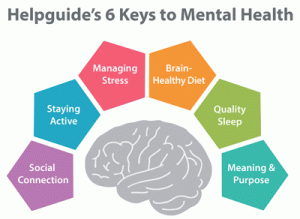Incorrect beliefs about psychological illness can trigger considerable problems. Learn what you can do about preconception. Stigma is when someone views you in an unfavorable method due to the fact that you have a distinguishing particular or personal characteristic that's thought to be, or actually is, a drawback (an unfavorable stereotype). Sadly, unfavorable mindsets and beliefs toward people who have a psychological health condition prevail.
Discrimination might be apparent and direct, such as someone making a negative remark about your mental disorder or your treatment. Or it may be unintentional or subtle, such as someone preventing you since the individual assumes you could be unsteady, violent or hazardous due to your psychological disease. You may even judge yourself.
Don't let the worry of being identified with a mental disorder prevent you from seeking help. Treatment can provide relief by identifying what's incorrect and decreasing symptoms that interfere with your work and individual life. Stigma doesn't just originate from others. You may erroneously think that your condition signifies personal weak point or that you ought to have the ability to control it without help.
If you have a mental disorder, you may be hesitant to tell anybody about it. Your family, good friends, clergy or members of your community can offer you support if they understand about your mental health problem. how does mental illness affect physical health. Connect to people you trust for the compassion, assistance and understanding you need. You are not an illness.
Some state and federal companies and programs, such as those that focus on trade rehab and the Department of Veterans Affairs (VA), offer assistance for people with mental health problem. If you or your kid has a mental disorder that affects knowing, find out what plans and programs may help. Discrimination versus students because of a mental disease protests the law, and teachers at main, Extra resources secondary and college levels are needed to accommodate trainees as finest they can.
If a teacher does not understand about a trainee's impairment, it can cause discrimination, barriers to finding out and poor grades. Think about expressing your viewpoints at events, in letters to the editor or on the web. It can help instill courage in others facing similar difficulties and inform the general public about psychological illness.
The 7-Minute Rule for How Does Incarceration Affect Mental Health

Finding out to accept your condition and acknowledge what you need to do to treat it, seeking support, and helping inform others can make a huge distinction. May 24, 2017 Show referrals StigmaFree me. National Alliance on Mental Disorder. https://www. nami.org/Get-Involved/Take-the-stigmafree-Pledge/StigmaFree-Me. Accessed April 25, 2017. What is preconception? Why is it an issue? National Alliance on Mental Illness.
nami.org/stigmafree. Accessed April 25, 2017. Preconception and mental disorder. Centers for Illness Control and Avoidance. https://www. cdc.gov/ mentalhealth/basics/stigma-illness. htm. Accessed April 25, 2017. Sickel AE, et al. Psychological health stigma: Effect on mental health treatment mindsets and physical health. Journal of Health Psychology. http://journals. sagepub.com/doi/pdf/10. 1177/1359105316681430. Accessed April 25, 2017. Americans with Disabilities Act and mental disorder.
gov. https://www. womenshealth.gov/ mental-health/your-rights/americans-disability-act. html. Accessed April 25, 2017. Picco L, et al. Internalized stigma amongst psychiatric outpatients: Associations with lifestyle, functioning, hope and self-esteem. Psychiatric Research. 2016; 246:500. The civil rights of students with hidden specials needs under Area 504 of the Rehab Act of 1973. U.S. Department of Education.
ed.gov/ about/offices/list/ ocr/docs/hq5269. html. Accessed May 2, 2017. Wong EC, et al. Results of stigma and discrimination reduction trainings conducted under the California Mental Health Providers Authority. Rand Health Quarterly. 2016; 5:9.
Source: Pixabay/Wokandapix Some individuals insist stigma around psychological health is no longer a concern in our society, and mental disorder no longer a taboo topic. Those having this mindset likely do not reside in a neighborhood where requesting for assistance indicates possible ostracization, or come from a cultural background in which seeking psychological aid is deemed as weak point, or have actually not had the unfortunate experience of being rejected access to care due to below average psychological health benefits.
While going to treatment and taking psychotropic medication is largely accepted in cosmopolitan cities like New York and Los Angeles, the exact same can not be said for lots of other parts of the country, nor for many parts of the world. According to Mental Health America (MHA), 43. 7 million Americans struggle with a mental health conditions yearly.
Getting My Why Does Mental Health Affect Physical Health To Work
There are numerous reasons for the gap in care, however stigma and discrimination fall high on that list. "Many individuals feel shame about looking for aid," says psychology professor Bethany Teachman. "The impact of stigma is terrible because mental health difficulties are really extremely common, and we have good treatments." According to Teachman, preconception leads to discrimination in housing, work, and education.
" Society has constantly viewed mental disorder as an indication of weakness. Regardless of how much we have discovered about how the brain works in the last 50 years, stigma still persists," says Marina Olson, who deals with MakeitOk. org, an initiative to fight stigma by educating the public about psychological health and encouraging people to talk about it.
" Asian Americans in specific discover a lot of pity and correspond mental health issues with failure." The same holds true amongst many other cultures. According to Quentin Vennie, author of Strong in the Broken Places: A Memoir of Addiction and Redemption Through Health, among the greatest stigmas affecting the black neighborhood is the belief that having a mental health disorder makes up weakness.
" Mental health is not a race, religious beliefs or gender issueit's a mankind issue, and it's my aim to assist bring the focus to treating it on a human level." Check out here "You probably know someone with a psychological health issue and don't even recognize it," says Silvia M. Dutchevici, MA, LCSW, president and creator of the Critical Therapy Center, "because lots of people with mental health issue are extremely active and productive members of our neighborhoods." Regardless of the myth that people with a psychological disease are more most likely to be violent, research study reveals this is not the case.
Department of Health and Human Services website, those with severe mental disorders are over 10 times most likely to be the victims of violence than the basic population. "Regrettably, the media and politicians are not helping in removing the stigma around mental health," Dutchevici says. "As language forms our understanding of truth, when we hear media and political leaders using terms related to mental illness when a tragedy happens, it is no wonder we still fear mental illness." Because we are a society so attached to the media, why not take advantage of the opportunity to inform people and to challenge incorrect messages rather than perpetuate them? Rather of portraying those with mental disorders as harmful, possibly depict them like you or me, as nobody is immune to mental health problem.

According to Greenburger: There has been a disregard or objection of the political system to acknowledge or legitimize mental disorder and to produce appropriate conditions for its treatment. Preconception not just rejects the specific the capability to get assistance and compassion from others in the very same way physical disease does, but permits federal government to turn its back on mental disease and determine that it is not a severe issue that impacts people's behavior.